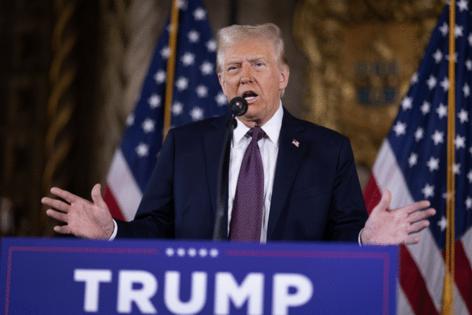Trump bid to delay sentencing in hush money case in hands of Supreme Court after rejection by NY appeals court
Published in Political News
NEW YORK — New York’s highest court on Thursday rejected Donald Trump’s effort to stop his sentencing from going ahead Friday, leaving the matter in the hands of the Supreme Court.
In a letter to Trump’s attorney, Todd Blanche, a New York Court of Appeals clerk said Associate Judge Jenny Rivera had reviewed a proposed order that Trump’s side submitted Wednesday seeking to halt the sentencing and had declined to sign it. Prosecutors from Manhattan District Attorney Alvin Bragg’s office had opposed the request.
Trump is now waiting to see if the Supreme Court will step in at his behest and stop the proceeding from going forward on Friday.
His lawyers asked the nine justices to intervene in a request Wednesday, arguing that the judge who presided over Trump’s trial, Manhattan Supreme Court Justice Juan Merchan, wrongly refused to recognize his immunity during the trial and in trying to sentence him during his transition.
In prosecutors’ response to Trump’s Supreme Court bid, the Manhattan DA asked the high court on Thursday to deny the effort and said there was no basis for its intervention.
“[Defendant] makes the unprecedented claim that the temporary presidential immunity he will possess in the future fully immunizes him now, weeks before he even takes the oath of office, from all state-court criminal process,” the filing read.
“This extraordinary immunity claim is unsupported by any decision from any court. It is axiomatic that there is only one President at a time.”
Merchan unexpectedly scheduled the proceeding to take place on Friday at 9:30 a.m. in a decision last week that upheld the guilty verdicts against Trump.
He rejected the notion that Trump’s election victory warranted throwing out the case and that the Supreme Court’s July decision on presidential immunity, which found that a president is mostly shielded from criminal liability for “official acts,” in any way protected Trump from legal proceedings as he prepares to retake office.
In December, Merchan found that the immunity decision did not bar prosecutors from presenting certain evidence at trial related to Trump’s unofficial conduct during his first stint in the White House.
Merchan said that the president-elect could appear for sentencing by video and that he was inclined to sentence him to an unconditional discharge, meaning he would not face jail time, fines, or probation.
Though Trump is not expected to face any form of punishment, the sentencing would finalize his conviction and officially classify him as a convicted felon just 10 days before his second presidential term begins, a first in history.
Merchan declined to cancel the sentencing on Monday, responding to a weekend request from Trump, leading to a dizzying blitz of appeals. After a lower-level New York appeals court rejected his lawyer’s demands to halt the sentencing Tuesday and appeared heavily skeptical of the argument that Trump has presidential immunity as a president-in-waiting, Trump targeted appeals at the New York Court of Appeals and the Supreme Court.
His Supreme Court bid Wednesday said New York courts erred in denying his requests to stop the sentencing and that the Constitution required the case to be paused while Trump challenged Merchan’s rulings.
The emergency petition said the president-elect was “suffering grave irreparable injury from the disruption and distraction that the trial court abruptly inflicted by suddenly scheduling a sentencing hearing for the President-Elect of the United States, on five days’ notice, at the apex of the Presidential transition.”
A jury on May 30 found Trump, 78, guilty of 34 felony counts of falsifying business records stemming from a scheme to hide embarrassing details about his past from voters in 2016 that violated New York election law.
The case centered on payments he made to Michael Cohen during his first year in the White House, which reimbursed his longtime former fixer for paying off porn star Stormy Daniels to silence her claims of a sordid sexual encounter with Trump in 2006.
The Manhattan case was the only one of four brought against Trump after his first term that made it before a jury. When he takes office, he cannot pardon himself of the state-level charges.
-----------
©2025 New York Daily News. Visit at nydailynews.com. Distributed by Tribune Content Agency, LLC.




























































Comments